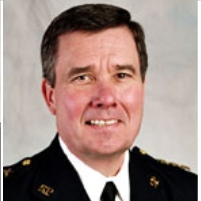Director of Drug Control Policy: Who is R. Gil Kerlikowske?
Tuesday, February 24, 2009

President Obama’s apparent nominee to be the nation’s new “drug czar,” Robert Gil Kerlikowske, has spent nearly 30 years in law enforcement, including a stint as a narcotics officer and eight years as Seattle’s police chief, during which he downplayed the importance of arresting individuals for marijuana possession.
Born in Fort Myers, Florida, in 1949, Kerlikowske was raised by his mother and stepfather, who was a judge. As a high school student, Kerlikowske worked as a crime scene photographer on weekends, and he discovered his love for law enforcement while fingerprinting criminals at a Florida jail. Kerlikowske enrolled in St. Petersburg Junior College, but was drafted into the army in 1970, and joined the Army Military Police. He was stationed in Washington, DC, where his duties included saluting then-President Richard Nixon as he boarded the Marine One helicopter.
Kerlikowske married in 1972, and he and his first wife, Carol, had two children. After leaving the military, Kerlikowske began his law enforcement career in 1972 as a street cop for the St. Petersburg Police in Florida. His assignments included work as an undercover narcotics detective, an internal affairs investigator and a police hostage negotiator. By 1985 he had been promoted to head of the department’s criminal investigation division.
In his off hours, Kerlikowske attended college at the University of South Florida, where he earned a bachelor’s degree (1978) and a master’s degree (1985) in criminal justice. He later graduated from the National Executive Institute at the Federal Bureau of Investigation Academy in Quantico, Virginia, in 1984.
He was hired to be the police chief for the town of Port St. Lucie in Florida in March 1987. He later held the same post for Fort Pierce beginning in January 1990, before moving in 1994 to Buffalo, New York, to become police commissioner.
Kerlikowske was the first department outsider to lead the Buffalo police department. He was credited for lowering the crime rate, improving police relations with the community and introducing basic technological advancements in the Buffalo police department, along with instituting random drug testing of officers.
He married his second wife, criminal justice researcher Anna Laszlo, in 1995.
In 1998, Kerlikowske relocated to Washington, DC, to join the US Department of Justice during the Clinton administration. There, he served as a deputy director for the Office of Community Oriented Policing Services, where he oversaw community policing grants. During his time at the Justice Department, Kerlikowske established a strong relationship with Eric Holder, who served as deputy attorney general during the Clinton years, and is now US Attorney General.
Kerlikowske was selected to become Seattle’s police chief in 2001. During his tenure in Seattle, Kerlikowske won credit for stabilizing the department after the stormy departure of Norm Stamper as chief in the wake of the 1999 World Trade Organization riots in Seattle. Crimes rates dipped during his time as chief, reaching historic lows in recent years.
But his time as police chief was not without some controversy and drama. Kerlikowske faced criticism over the department’s slow response to the 2001 Seattle Mardi Gras Riots that left one man dead and 70 people with injuries. During the incident, he ordered the police at the scene not to intervene, instead maintaining a perimeter around the violence. The city of Seattle acknowledged that police strategy presented a public safety threat, and settled with the murder victim’s family for just under $2,000,000. The next month, The Seattle Police Officers’ Guild voted no confidence in the chief, citing both the Mardi Gras riot and his public reprimand of an officer for being rude to a group of young jaywalkers.
In 2003, Kerlikowske was asked about his views on a local ballot initiative to make marijuana possession the lowest law enforcement priority. In response, he stated that “arresting people for possessing marijuana for personal use... is not a priority now.”
In 2004, Kerlikowske admitted publicly that he had been recruited to leave Seattle to run police departments in San Francisco and Boston. In September 2004, he allowed himself to be jolted with 50,000 volts of electricity to demonstrate the non-lethal efficiency of Taser guns. And in December, he left a 9-mm Glock semiautomatic handgun underneath the seat of his car while shopping with his wife. The gun was stolen out of his car, and a spokesman for Kerlikowske said the chief was “chagrined.”
In July 2007, a citizen oversight panel accused Kerlikowske of repeatedly interfering in an internal investigation into the actions of a pair of officers accused of beating a suspect.
Chief R. Gil Kerlikowske Biography (Seattle Police Dept)
Gil Kerlikowske: Obama's New Drug Czar? (by Kate Pickert, Time)
Seattle police chief to become nation's drug czar (by Steve Miletich and Mike Carter, Seattle Times)
Officers taking no-confidence vote on chief; mayor backs Kerlikowske (by Ian Ith, Seattle Times)
Gil Kerlikowske: Obama's Drug Czar (Huffington Post)
- Top Stories
- Unusual News
- Where is the Money Going?
- Controversies
- U.S. and the World
- Appointments and Resignations
- Latest News
- Trump Renames National Football League National Trump League
- Trump to Stop Deportations If…
- Trump Denounces World Series
- What If China Invaded the United States?
- Donald Trump Has a Mental Health Problem and It Has a Name






Comments